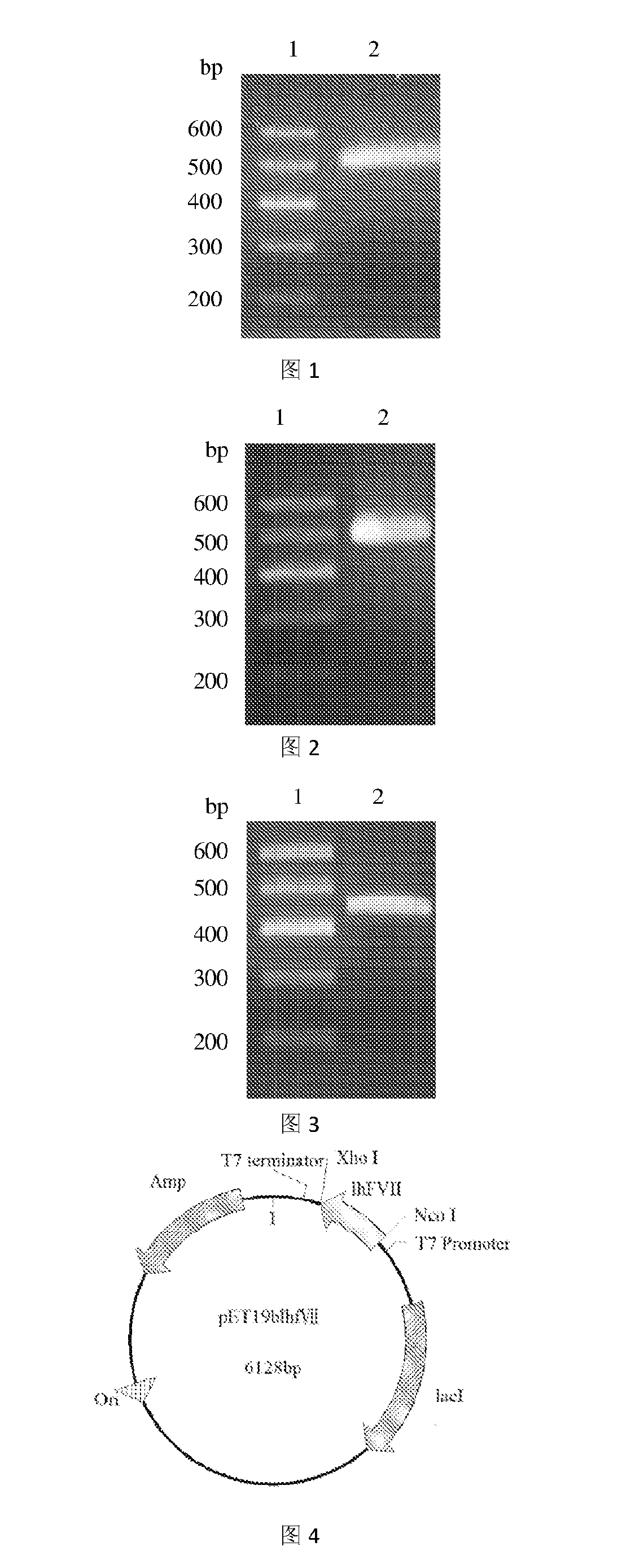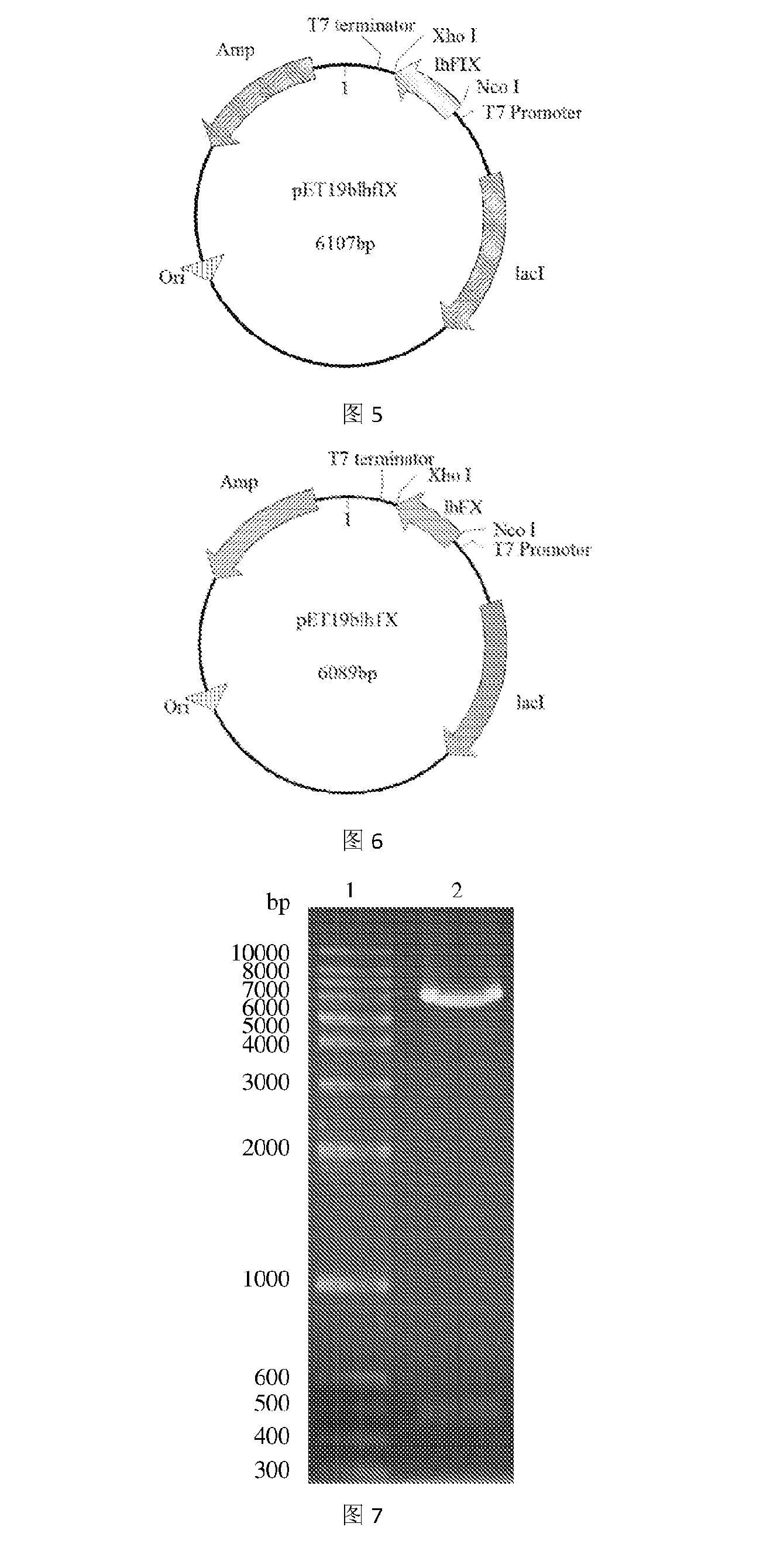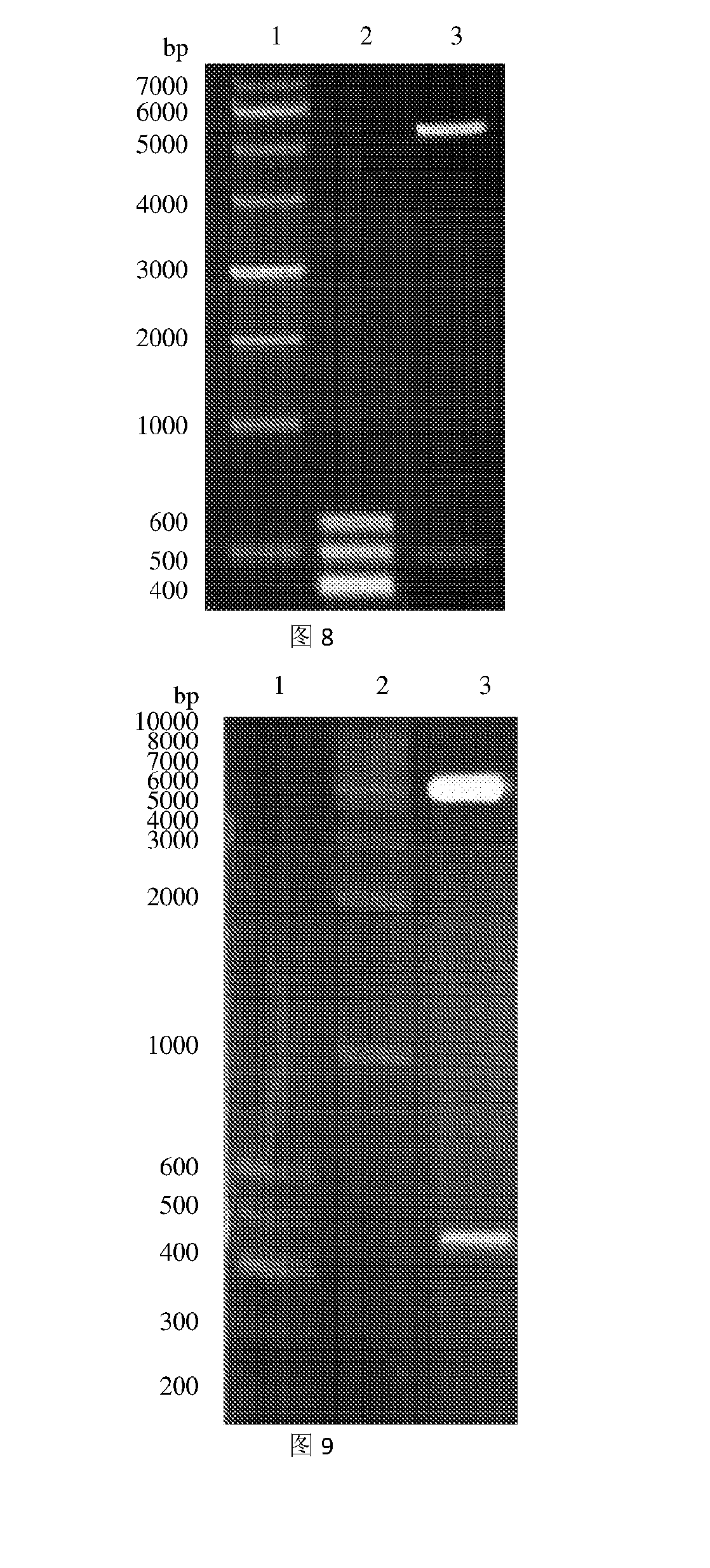Human coagulation factor light chain protein and use of the same
a technology of coagulation factor and light chain protein, which is applied in the field of biomedical, can solve the problems of increasing the difficulty of treating disease, and still challenging clinical scenario for treatment of endotoxemia caused by gram's negative bacteria infection, and achieves excellent targeted bactericidal effect, significant inhibitory effect, and disruption of cellular structur
- Summary
- Abstract
- Description
- Claims
- Application Information
AI Technical Summary
Benefits of technology
Problems solved by technology
Method used
Image
Examples
example 1
Obtaining the Gene Encoding the Recombination Protein LhF VII
[0064]1. The primers for PCR amplification as shown below were synthesized (by Invitrogen Biological Technology Co. Ltd.):
Primer 1:SEQ ID NO: 75′-TAACCATGGGCCATCATCATCATCATCACGCCAACGCGTTCCTGGAG Nco IGA-3′Primer 2:SEQ ID NO: 85′-TATCTCGAGTTATCGGCCTTGGGGTTTGCTGGCATT-3′ Xho I
[0065]2. PCR Amplification System
[0066]The PCR amplification was performed with Primers 1 and 2 using a plasmid comprising the CDS region of human coagulation factor VII (FulenGen Co. Ltd., Guangzhou) as the template. An Nco I restriction site and a His×6 tag for protein purification were introduced into the sequence of Primer 1, and an Xho I restriction site was introduced into the sequence of Primer 2. After the amplification, a DNA fragment of 497 bp comprising the coding sequence for the human coagulation factor VII light chain was obtained. The PCR reaction system (50 μL) was as follows:
[0067]Deionized water: 31.5 μL
[0068]5×Reaction buffer...
example 2
Obtaining the Gene Encoding the Recombination Protein LhF IX
[0077]1. The primers for PCR amplification as shown below were synthesized (by Invitrogen Biological Technology Co. Ltd.):
Primer 1:SEQ ID NO: 95′-ATACCATGGGCCATCATCATCATCATCATTATAATTCAGGTAAATT Nco IGGAAG-3′Primer 2:SEQ ID NO: 105′-ATTCTCGAGTTAACGGGTGAGCTTAGAAGTTTGT-3′ Xho I
[0078]2. PCR Amplification System
[0079]The PCR amplification was performed with Primers 1 and 2 using a plasmid comprising the CDS region of human coagulation factor IX (FulenGen Co. Ltd., Guangzhou) as the template. An Nco I restriction site and a His×6 tag for protein purification were introduced into the sequence of Primer 1, and an Xho I restriction site was introduced into the sequence of Primer 2. After the amplification, a DNA fragment of 476 by comprising the coding sequence for human coagulation factor IX light chain was obtained. The PCR reaction system (50 μL) was as follows:
[0080]Deionized water: 31.5 μL
[0081]5×Reaction buffer: 10 μ...
example 3
Obtaining the Gene Encoding the Recombination Protein LhF X
[0090]1. The primers for PCR amplification as shown below were synthesized (by Invitrogen Biological Technology Co. Ltd.):
Primer 1:SEQ ID NO: 115′-ATACCATGGGCCATCATCATCATCATCATGCCAATTCCTTTCTTGA Nco IAGAG-3′Primer 2:SEQ ID NO: 125′-ATTCTCGAGTTAGCGTTCCAGGGTCTGTTTCC-3′ Xho I
[0091]2. PCR Amplification System
[0092]The PCR amplification was performed with Primers 1 and 2 using a plasmid comprising the CDS region of human coagulation factor X (FulenGen Co. Ltd., Guangzhou) as the template. An Nco I restriction site and a His×6 tag for protein purification were introduced into the sequence of Primer 1, and an Xho I restriction site was introduced into the sequence of Primer 2. After the amplification, a DNA fragment of 458 by comprising the coding sequence for the human coagulation factor X light chain was obtained. The PCR reaction system (50 μL) was as follows:
[0093]Deionized water: 31.5 μL
[0094]5×Reaction buffer: 10 μ...
PUM
| Property | Measurement | Unit |
|---|---|---|
| Coagulation enthalpy | aaaaa | aaaaa |
Abstract
Description
Claims
Application Information
 Login to View More
Login to View More - R&D
- Intellectual Property
- Life Sciences
- Materials
- Tech Scout
- Unparalleled Data Quality
- Higher Quality Content
- 60% Fewer Hallucinations
Browse by: Latest US Patents, China's latest patents, Technical Efficacy Thesaurus, Application Domain, Technology Topic, Popular Technical Reports.
© 2025 PatSnap. All rights reserved.Legal|Privacy policy|Modern Slavery Act Transparency Statement|Sitemap|About US| Contact US: help@patsnap.com



